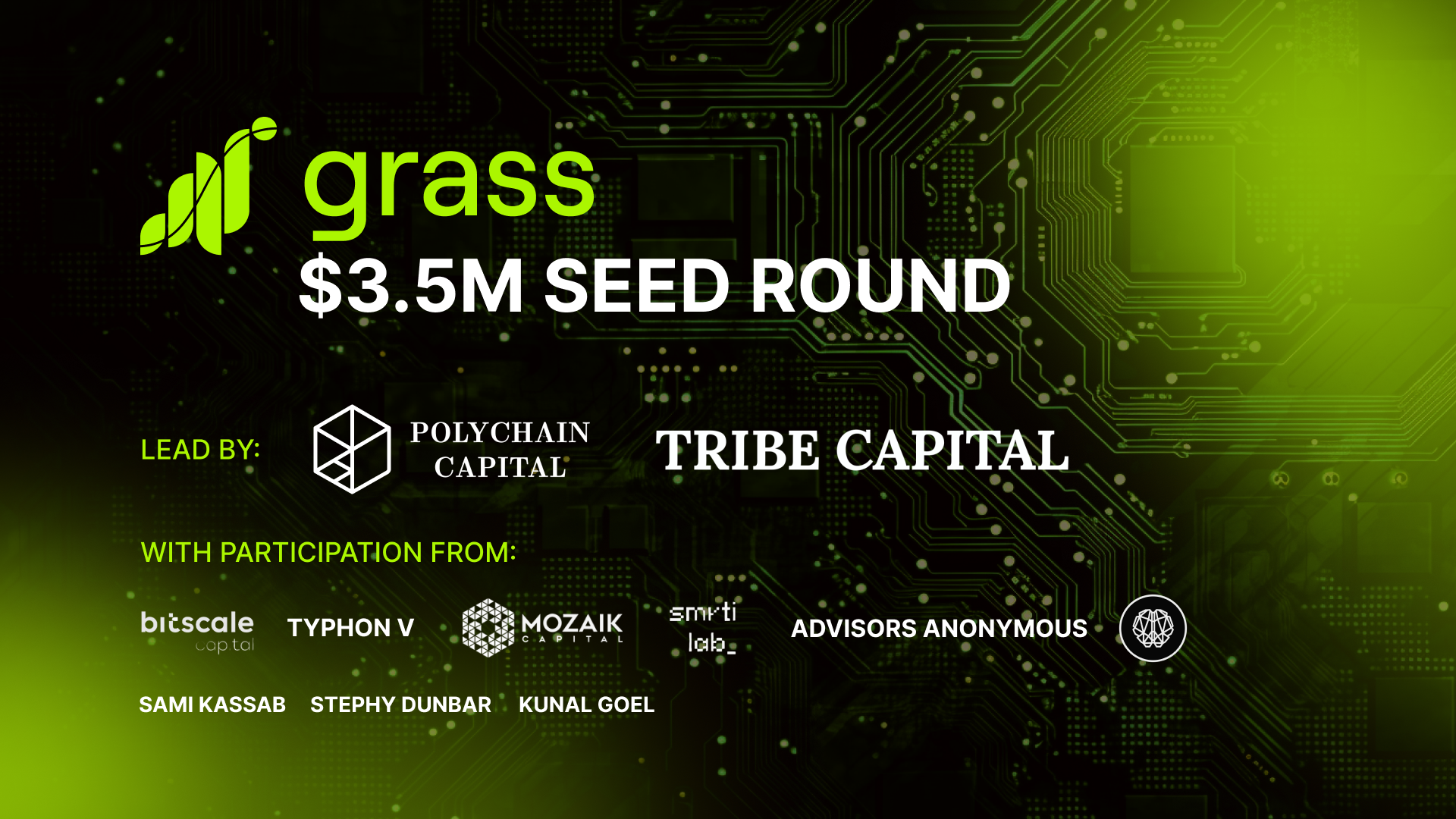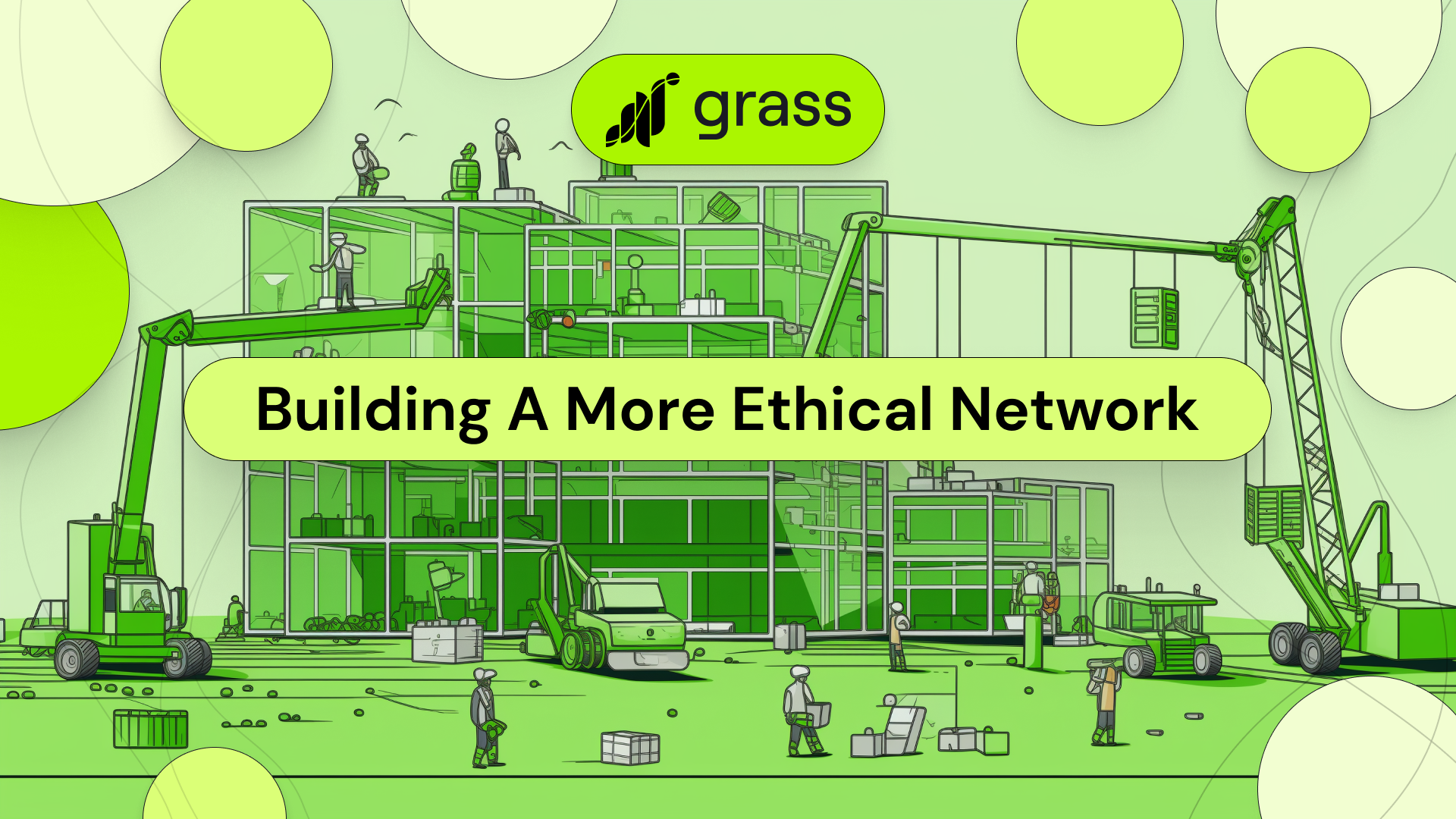Grass -Get Paid for Your Unused Internet
 If you've come across discussions about Grass, the flagship product from Wynd Network, you might be curious about what it entails. Grass is an upcoming browser extension aiming to enable users to monetize their internet connection by selling their unused network resources. But what exactly are these resources, and what does it mean to sell "your view of the internet"?
If you've come across discussions about Grass, the flagship product from Wynd Network, you might be curious about what it entails. Grass is an upcoming browser extension aiming to enable users to monetize their internet connection by selling their unused network resources. But what exactly are these resources, and what does it mean to sell "your view of the internet"?
Think of Grass as a tool that lets you capitalize on an asset you might not have realized you possess. Let's delve into what this asset is.
Firstly, let's explore why your internet connection holds value and why others are willing to pay for it.
Then, we'll examine the current market for these resources and how centralized proxy providers already exploit your network space without compensating you.
Lastly, we'll introduce Grass: a decentralized residential proxy market that disrupts the traditional business model and ensures fair compensation for users.
Grass has the potential to revolutionize this industry, creating a more just, secure, and ethical marketplace for network resources. Let's dive deeper into how it operates.
- Understanding Residential IP Proxies
- At the core of this concept lies data.
Consider an airline seeking to gather pricing information from competitors' websites or verify if their ads are displayed in targeted markets. To achieve this, they need access to the internet from various sources and locations.
This is where you come in.
Every time you connect to the internet, you use a unique IP address, with much of your online experience tailored to your location. Acting as a residential IP proxy means allowing someone to route their internet traffic through your IP address, enabling them to view the internet from your perspective and gather public data.
What does this mean practically?
It involves sharing your internet connection with others. For instance, if you have a 100 MB/s connection but only use 30 MB/s to download a file, the remaining 70 MB/s of idle bandwidth can be utilized by companies to scrape the web using your IP address.
While this might seem insignificant at first glance, the demand for public web data for market research is growing rapidly. Despite facilitating this data acquisition, internet users like yourself currently receive no rewards for their contributions.
- The Current Residential Proxy Market
- Presently, a few centralized service providers dominate the market for residential IP proxies. These companies establish large proxy networks using residential IPs worldwide, selling unused bandwidth to buyers. Unfortunately, this arrangement often lacks fairness.
In some cases, residential internet users consent to participate in these networks, receiving compensation for their resources. However, these users are typically paid as little as possible, as the networks prioritize maximizing their profits.
In the worst-case scenario, users are unaware that their unused bandwidth is being utilized by proxy networks, with no compensation whatsoever.
Ultimately, this results in users essentially subsidizing these proxy networks without any benefit.
- Introducing Grass
- Grass serves as a decentralized alternative to the current centralized networks. It allows users to sell their unused bandwidth in exchange for token rewards.
These tokens not only compensate users but also grant them ownership and governance rights within the Grass network. This decentralized approach ensures fairness and empowers users who were previously exploited by centralized networks.
Compared to centralized counterparts, Grass is:
Ethical: It ensures users are fairly compensated for their contributions.
Democratic: Token rewards provide users with ownership and governance rights.
Secure: Decentralization reduces the risk associated with centralized control.
In essence, Grass takes a principled stance in this industry, providing a fairer distribution of resources and empowering users. It represents a significant step towards a more equitable internet ecosystem.
Stay tuned for more details about Grass as we approach the beta launch in June. With Grass, your internet connection will be back in your hands, ensuring a fairer and more transparent online experience.
Use my link to download now: https://app.getgrass.io/register/referralCode=vO0oGfOZGyxFdOP

What is Grass?
Grass is a platform designed to help users monetize their unused internet bandwidth by selling it to corporations and institutions. It operates seamlessly in the background of your devices, providing passive income from a resource you may not have realized you possess.
How do I use Grass?
To begin earning, simply download the application from the Google Play Store or Chrome Extension Store, sign up, and start utilizing it.
Who purchases the bandwidth on Grass?
Various industries, particularly AI labs, have a growing need for internet bandwidth. These labs utilize Grass to access public web data essential for training AI models.
How do AI Labs utilize Grass?
Grass aids AI labs in two primary ways: facilitating direct web scraping for data collection and providing curated datasets essential for AI development.
How is my personal data protected while using Grass?
Your personal data remains secure as Grass and Wynd Network do not access or utilize any of your personal information. The browser extension does not have access to your computer's data, ensuring your privacy and security.
Why does the Grass web extension request permission to "read and change all your data on the websites you visit"?
This permission is standard for many Chrome plugins and solely indicates that you provided your email address during sign-up.
What is Wynd Network?
Wynd Network is the parent company overseeing Grass, ensuring vetted buyers purchase bandwidth on the network.
Are there any limitations to using Grass?
Earnings may be split between accounts on the same Wi-Fi network, and Grass cannot be used with a VPN enabled.
How are rewards paid out?
During the Beta phase, users earn Grass points, which will be converted into network ownership at the beta's end. While direct cash-out options are not yet available, additional payment methods, including gift cards, are being explored.
What is internet bandwidth?
Internet bandwidth refers to the capacity of an internet connection to transmit information. Grass enables users to monetize their unused bandwidth, providing a source of passive income.
Who utilizes my unused internet bandwidth?
Grass allows users to sell their unused internet bandwidth to carefully vetted companies, including Fortune 500s and academic institutions.
Why do buyers seek unused internet bandwidth?
Buyers utilize unused internet bandwidth to access a diverse range of IP addresses, aiding in tasks such as market research and AI training while providing passive income to users.
Can I download Grass on multiple devices?
While Grass can be downloaded on multiple devices, uptime earnings are split among accounts on the same Wi-Fi network.
Can I create multiple accounts to earn more?
Each user is permitted only one account to prevent abuse of the referral program.
How does the referral system work?
The referral system rewards users for bringing in new members and their subsequent referrals, offering bonuses based on their activity levels.
What variables contribute to the network score?
The network score considers factors such as geographic location and network traffic to reflect buyer demand for bandwidth.
Please note: Network scores may fluctuate over time based on demand.
While the concept isn't novel and proxy networks have existed for years, the industry has been overtaken by commercial entities that exploit users by inadequately compensating them for their sold bandwidth. Some even obtain bandwidth through unethical means, providing no compensation at all. This is where we step in, and we want to elucidate how we stand apart from the competition and why this differentiation is crucial.
Today, we delve into a topic close to our hearts: reforming an industry by creating a network owned by and for the people's benefit. Read on to discover how you can increase your stake in the network and share in the profits.
The Origin of Residential Proxy Networks
Residential proxy networks originated in the early 2000s as part of anonymity networks, offering users a means to browse the web without surveillance. These networks, driven by the belief in privacy as a fundamental right, allowed users to bypass censorship and government oversight. They relied on a network of volunteer nodes worldwide, often hosted by individuals, to ensure privacy.
However, the commercialization of these networks altered their trajectory.
The Commercial Model
Proxy networks, at their core, connect sellers (users with excess bandwidth) with buyers (e-commerce companies, adtech agencies, etc.). However, commercialization led to exploitation. Private enterprises, leveraging their resources, capitalized on this collective resource, extracting value while minimizing compensation to users. Users were coerced into accepting unfavorable terms, essentially relinquishing control over their bandwidth to profit-driven entities.
This resulted in an unjust system where the majority supplied the product, yet a privileged few reaped most of the benefits. Users received minimal compensation, as the network prioritized its profits over fair compensation. This dynamic created a parasitic relationship, with the network exploiting its users for maximum gain.
Parasitic Proxies
Commercial networks not only underpay users but also resort to unethical practices. Some networks, like HolaVPN, deceived users by selling their bandwidth to private companies without their knowledge. Users unwittingly became involuntary suppliers of bandwidth, receiving no compensation.
While not all proxy networks engage in such tactics, the profit-driven nature of commercial networks inherently prioritizes the network's profits over user compensation.
Grass seeks to revolutionize this model by democratizing network ownership. Tokenization fundamentally alters the network's design, eliminating private ownership and ensuring that 100% of revenue generated returns to users as rewards. Collective ownership ensures decisions align with users' interests, eliminating incentives for exploitation.
Our philosophy revolves around honesty, transparency, and community ownership. Grass is a network built by and for its users, with success benefiting everyone involved. As we continue to expand and reach our active node threshold, we're grateful for your support in building a fairer, more equitable network. Join us as we embark on this journey toward shared success.































































